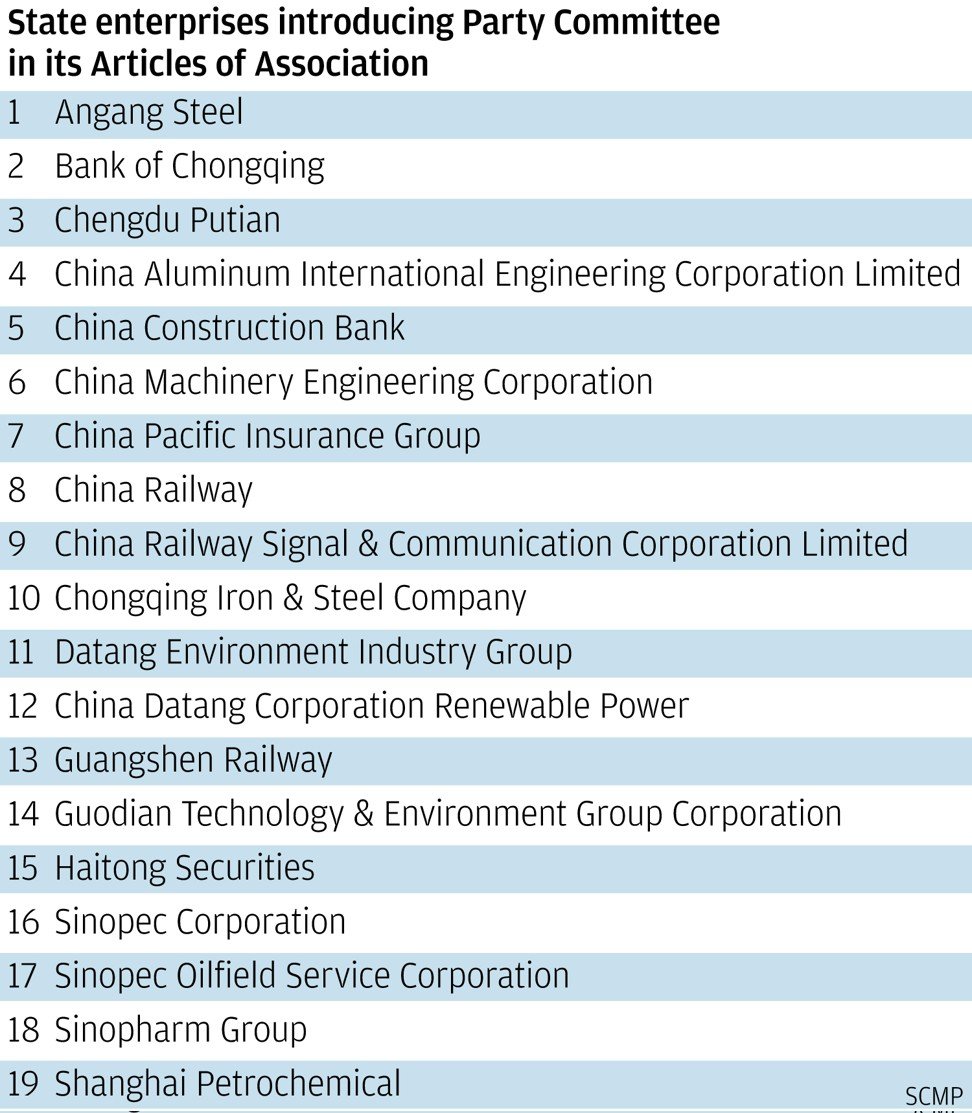The hammer and sickle are making their way into some Hong Kong public companies
As many as 19 Chinese state companies listed on the Hong Kong Stock Exchange have established Communist Party committees. Whose rules do they hew to?
At least 19 of the Chinese state-owned enterprises listed in Hong Kong are establishing Communist Party committees, and making them a key governing body to “advise” their boards on operational, personnel and strategic matters.
The city’s securities regulators have so far done nothing to bring members of these powerful committees under its regulations to protect shareholders’ interest and market integrity.
In China, the party has the ultimate say in state enterprises. For decades, that was more style than substance, but President Xi Jinping is making the party’s control very real.
Secondly, the committee commands resources. Most of the 19 promise to pay for the committees’ staffing and expenses.
Thirdly, the committee commands power. Its superior position in the corporate hierarchy is best illustrated by China Construction Bank’s proposed amendment: “(The party committee) instructs and promotes the Senior Management to implement the decisions of the Shareholders’ General Meeting and the Board.”
The details are equally overwhelming. According to Bank of Chongqing’s proposed change, the party committee can vet the senior management candidates nominated by the board and propose its own candidates. It will participate in the decision making in operations and production, asset restructuring, capital management, mergers, the opening and closing of branches, performance appraisals of senior management, and remuneration.
The party committee will “deliberate material matters” proposed and “communicate their opinion” to the board and senior management before the latter meet.
Can you imagine the board saying no to the party committee?
In fact, the articles of association of China Pacific Insurance and Haitong Securities have made it clear that their management boards shall make decisions according to the party committee’s opinion on major operational and management matters involving national macroeconomic control, development and security.
The party committee is formally introducing non-commercial considerations into the company’s governance, said an independent director who was not reappointed after refusing the amendment to the article. The intrusion into corporate governance is not only on key personnel appointments but in everything else. It is no longer occasional, but routine, the director said.
The impact could be magnified hundredfold because similar structures are being set up in all the subsidiaries and related entities.
China Railway Group has 708 party committees at different levels of its corporate structure, while Sinopharm Group has 91, excluding party committees at the bottom most level.
The change is significant, but Hong Kong’s regulators have been silent so far.
In response to Money Matters inquiry, a Hong Kong Stock Exchange spokesperson said the exchange “post-vets” the amendments and finds them in line with the city’s listing rules. Also, they must be approved by shareholders, she added.
Apparently, this significant compromise in corporate governance is not a major policy issue, but only a matter for “post-vet” in the eyes of our regulators. As long as the shareholders approve, their hands are clean.
But the reality is minority shareholders can’t stop the encroachment by the party, because the state, which is supposed to be “independent” from the party, is allowed to vote on these amendments.
One may say that it’s the political reality of investing in China, that we can only take it or leave it.
True, but party committee members in publicly traded companies should at least be bound by our listing rules and exchange regulations, given their de facto governing role and access to insider information.
This was how our regulators dealt with another political structure special to China -- the supervisory committee -- decades ago.
The Listing Rules require every supervisor to sign an undertaking similar to that of corporate directors, promising to abide by our regulations and laws including those covering the obligations of insiders. Party committee members sign no such undertaking, under current arrangements.
“The party committee members are usually directors,” according to the spokesperson. “As directors, they have to undertake to comply, and procure the company to comply with the Listing Rules.”
That is a convenient excuse from the tricky issue of reining in a party entity. The question is on what basis does the exchange come to the conclusion of “usually.”
Though the board chairman “usually” heads the party committees, it is not mandatory that all committee members be directors. Neither is the exchange entitled to the committee’s full membership list.
The response by the Securities & Futures Commission was no less disappointing.
“The Commission will perform our regulatory function under the Securities & Futures Ordinance and the Exchange has to discharge its duty under the Listing Rules,” said its spokesperson.
We need more than that, if we want to prove that Hong Kong is a capital market independent of mainland China.

No comments:
Post a Comment
Comments always welcome!